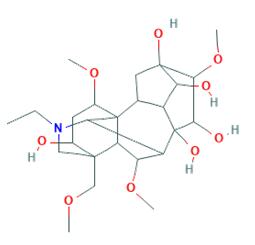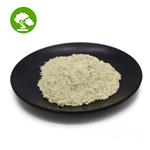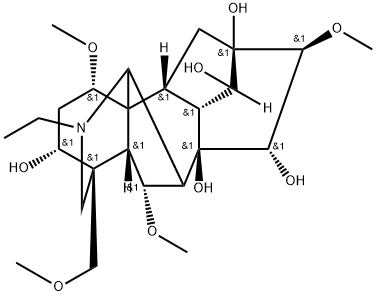Aconine – an alkaloid from Aconitum species
Aconine is an alkaloid originally isolated from Aconitum species and active metabolite of aconitine [1]. It inhibits osteoclast differentiation of RANKL-stimulated RAW 264.7 cells and bone resorption in a pit formation assay in a concentration-dependent manner [2]. Aconine also inhibits RANKL-induced activation of NF-κB and NFATc1 in RAW 264.7 cells. In vivo, aconine is toxic to mice when administered intravenously at a dose of 120 mg/kg.1 It induces flaccid paralysis and toxicity in rats with toxic dose (TD50) and LD50 values of 1.5 and 1.7 μmol per animal, respectively [3].

Aconiti Lateralis Radix Preparata is a traditional Chinese medicine used to treat chronic arthritis and is highly effective against rheumatoid arthritis. However, the effects of aconine, a derivative of aconitum alkaloids, on osteoclasts, which can absorb bone, remain unknown. Here, Zeng XZ etc. investigated the effects of aconine on osteoclast differentiation and bone resorption in vitro. The viability of mouse leukemic monocyte/macrophage cell line RAW264.7 was measured using CCK-8 assays. Osteoclast differentiation was induced by incubation of RAW264.7 cells in the presence of RANKL, and assessed with TRAP staining assay. Bone resorption was examined with bone resorption pits assay. The expression of relevant genes and proteins was analyzed using RT-PCR and Western blots. The activation of NF-κB and nuclear factor of activated T-cells (NFAT) was examined using stable NF-κB and NFATc1 luciferase reporter gene systems, RT-PCR and Western blot analysis. Treatment with Aconine significantly inhibits the RANKL-induced transcriptional activity of NF-κB in a dose-dependent manner. Aconine inhibits RANKL-induced osteoclast differentiation in RAW264.7 cells by suppressing the activation of NF-κB and NFATc1 and the expression of the cell-cell fusion molecule DC-STAMP. Aconine (0.125, 0.25 μM) does not affect the viability of RAW264.7 cells, but dose-dependently inhibits RANKL-induced osteoclast formation and bone resorptive activity. Aconine dose-dependently inhibits the RANKL-induced activation of NF-κB and NFATc1 in RAW264.7 cells, and subsequently reduces the expression of osteoclast-specific genes (c-Src, β3-Integrin, cathepsin K and MMP-9) and the expression of dendritic cell-specific transmembrane protein (DC-STAMP), which plays an important role in cell-cell fusion[2].
References
[1] Wada, K., Nihira, M., and Ohno, Y. Effects of chronic administrations of aconitine on body weight and rectal temperature in mice. J. Ethnopharmacol. 105(1-2), 89-94 (2006).
[2] Zeng, X.-Z., He, L.-G., Wang, S., et al. Aconine inhibits RANKL-induced osteoclast differentiation in RAW264.7 cells by suppressing NF-κB and NFATc1 activation and DC-STAMP expression. Acta. Pharmacol. Sin. 37(2), 255-263 (2016).
[3] Li, T.-F., Gong, N., and Wang, Y.-X. Ester hydrolysis differentially reduces aconitine-induced anti-hypersensitivity and acute neurotoxicity: Involvement of spinal microglial dynorphin expression and implications for aconitum processing. Front. Pharmacol. 7:367, (2016).
[4]https://pubchem.ncbi.nlm.nih.gov/compound/20054813
[5]http://www.chemspider.com/Chemical-Structure.10202348.html?rid=1ef0489a-14f4-40e8-9547-f83be1bd0832&page_num=0
You may like
Lastest Price from ACONINE manufacturers

US $0.00/kg2024-04-12
- CAS:
- 509-20-6
- Min. Order:
- 1kg
- Purity:
- 99%
- Supply Ability:
- 2000ton


